Gairatpur Bas: The song Tauba Tauba slices through the quiet of the Aravallis. A navy-blue SUV screeches to a stop in front of a two-storey wine shop flanked by cafes at Gurugram’s Gairatpur Bas village. Across the road, the Aravalli mountains stretch out. This is Delhi-NCR’s latest party hub—with the added thrill of a possible leopard sighting.
Now, the Gurugram authorities are planning to make good on a two-year-old threat: they are going to raze these illegal commercial establishments that have come up on private agricultural land.
“The area is called Leopard Trail. But with the number of humans that come here, any leopard would get scared,” said Mahesh, who runs a tea kiosk on the side of the road. “The leopards are too scared to come down.”
‘Leopard Trail’ wasn’t always a playground for NCR’s party animals. One road changed everything. Built four years ago to link NH-48 to Gairatpur Bas and the farmhouses nearby, it opened the floodgates. Today, huge cafes, a resort with a swimming pool, tea stalls, noodle kiosks, and a wine shop have sprung up to cater to the weekend crowds that party until the wee hours. They all come chasing the ‘greenery and tranquillity’ of the over 500-million-year-old mountains, but leave behind a little less of it each time.
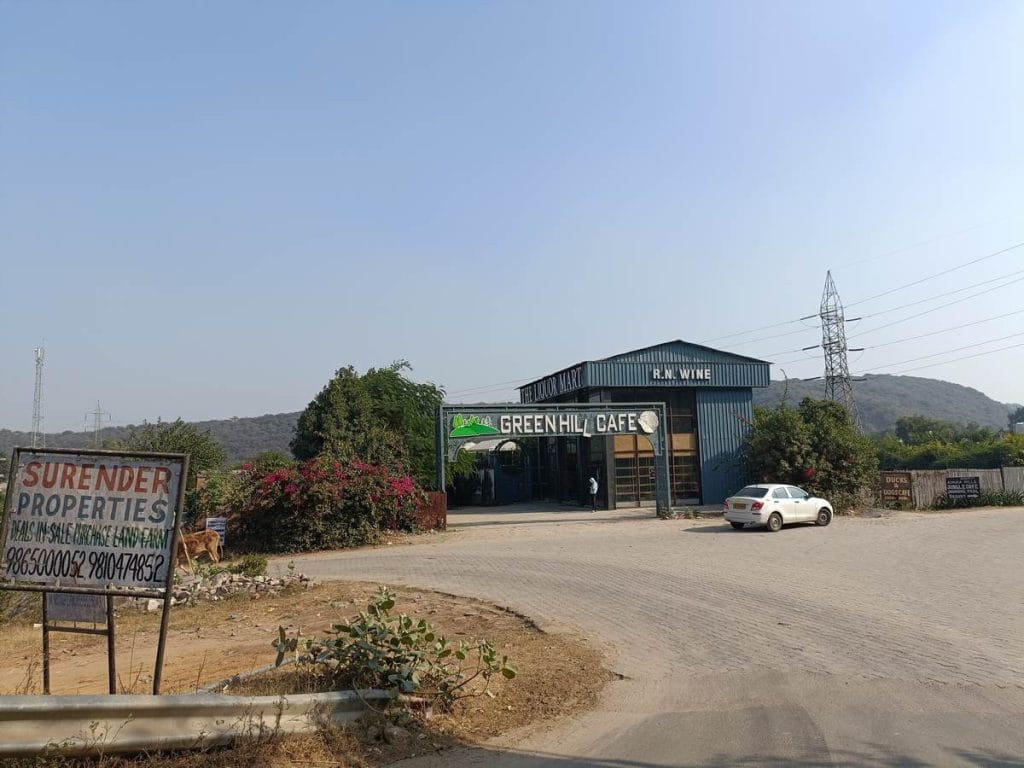
It’s pitted local farmers, proprietors, environmentalists, wildlife, and weekend tourists against each other. But there’s a new ‘demolition man’ in charge. RS Batth, the Gurugram Metropolitan Development Authority’s nodal officer is determined to clean house. Appointed on 26 November and tasked with looking into ‘critical land violations’, Batth has made it clear: unless cafe owners can produce change-of-land-use documents, the bulldozers will move in.
They talk of greenery and clean air and the beauty of the Aravallis. But it’s never about the forests and wildlife. It is only to make it more convenient for humans to access it
-Vaishali Rana, environmental activist
These establishments may be small in number, but they are symptomatic of a larger trend — the creeping encroachment of the Aravalli forests under the guise of tourism. Authorities promise strict action against illegal structures, but the presence and popularity of these businesses reveal the impunity with which the owners operate.
“We received similar notifications in the past, nothing happened,” said one cafe owner who did not want to be named. He and other owners are more worried about the Haryana government’s plan to create a grand safari park that would subsume Gairatpur Bas.
Environmentalists have their own apprehensions about the proposed jungle safari and eco-tourism plans. Gurugram-based environmental activist Vaishali Rana warned that the ecological impact on the Aravallis could be devastating.
“Demolishing these cafes is a step, but it is definitely not enough,” said Rana. “They’ll bring them down once and then two more will pop up in 20 days. What we need is a dedicated task force to patrol and protect the Aravallis from any kind of human encroachment.”
For Gurugram authorities, the issue with the Leopard Trail party hub isn’t its proximity to the Aravallis. They are concerned with illegalities stemming from regulatory issues, compliance, and paperwork.
Also Read: Delhi wetlands going extinct. To be found in govt files only
Social butterflies & party animals
The hangout spots on Leopard Trail call themselves ‘cafes’, but that would be a misnomer. These aren’t simple coffee shacks. They come with swimming pools, ATV rides, garden swings, play areas, and party halls. Some even offer rooms for overnight stays, inviting guests to wake up to views of the Aravalli mountains.
The menus are also varied. Some cafes stick to local staples like stuffed paranthas and chai served in clay cups, while others dish up pasta, burgers, momos, and customised menus for celebrations.
Khushboo, a consultant from Gurugram, visited one such cafe “to enjoy the winter sun” with her husband after hearing about it from a friend.
“It is a bit far from the city but my friend had the best birthday night here a few months ago,” said Khushboo. “The cafe is so open and lush, and we danced all night long! It gives slightly Bali vibes, doesn’t it?”
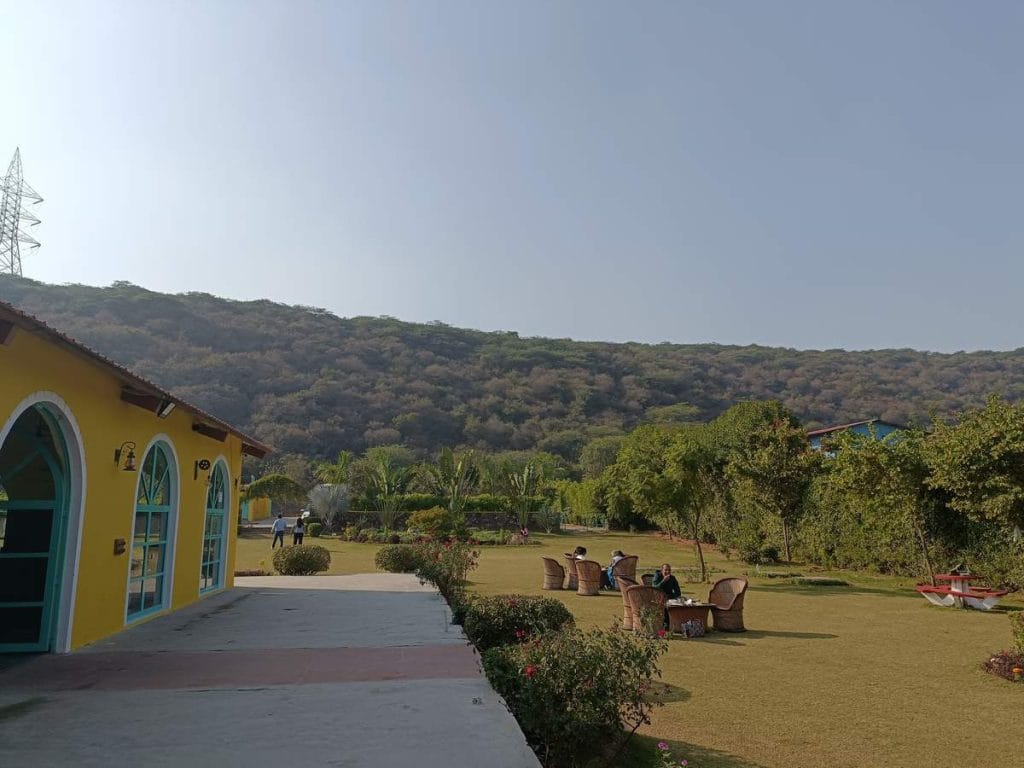
While cafe owners deny serving alcohol and keep it off the menu, Khushboo and her husband said private occasions like her friend’s birthday are usually ‘bring your own booze’ (BYOB) events. The wine shop conveniently located by the road doesn’t hurt, her husband added. The couple now plans to host their own anniversary party at one of the cafes in January, seeing how the serene location is a hit amongst their Gurugram-based friends.
They’ve yet to spot a leopard, though.
The Haryana Forest Department has clarified that “Leopard Trail” is not their official nomenclature for the site, it’s what all the city-slicker visitors call the stretch of land along the road connecting NH-48 to Gairatpur Bas village.
The label stuck after the cafe boom began around two years ago, with 20 establishments sprouting up in close proximity on private land. Since then, “Leopard Trail” has become what many call “Gurugram’s own hidden paradise”—although it is hardly a well-kept secret now.
We’re just catering to the crowd that already comes here — why is it illegal? We’re doing it on our own land
-Cafe owner at Leopard Trail
“Did you know that there’s something so beautiful in our own Gurugram? Now we don’t need to travel to Mussoorie and Rishikesh for nature,” said a social media influencer in a video where he led a group of six people on motorbikes into the Aravalli’s Leopard Trail. His video also showed the cafes dotting the landscape and the large weekend crowds.
The cafes themselves—with quirky names like Throttle Shrottle, Beige, and Q Cafe —have a strong social media presence, promoting everything from ATV adventures and nature walks to pet-friendly picnics.
“We’re just catering to the crowd that already comes here — why is it illegal? We’re doing it on our own land,” said one cafe owner, who declined to be named. He recalled receiving a show-cause notice from the Gurugram Metropolitan Development Authority (GMDA) about a year ago, but no follow-up orders or actions.
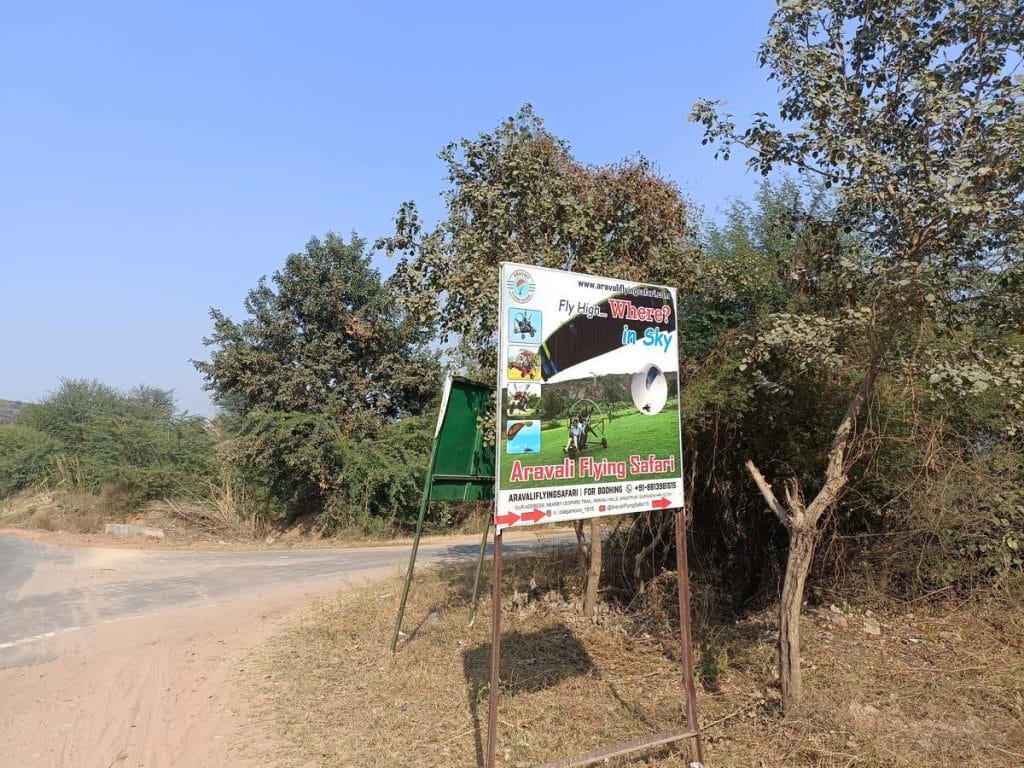
Another cafe manager described his clientele as mostly families and children who want to “experience farm life”. His establishment features a swimming pool, Haryanvi cuisine, and a menagerie of chickens, peacocks, buffaloes, and other farm animals for a rural touch. He too isn’t worried about any demolitions. Such threats have been made in the past as well, he said.
The fact that these commercial establishments are located barely a kilometre from the eco-sensitive Aravalli hills doesn’t factor into their argument.
“It is a classic chicken or the egg problem. You can’t ascertain if the cafes are what attract tourists here or if the tourists are the reason the cafes were set up,” said an environmentalist who works for the conservation of the Aravallis but did not wish to be named. “At the end of the day, it is still hurting the ecology of the hills.”
Raju Singh, a farmer who cultivates mustard and vegetables on his 2.5 acres of land in Gairatpur Bas is afraid to let his teenage daughters leave the house on weekends because of the droves of tourists that throng to the area.
Road to ‘world’s biggest safari park’
Gairatpur Bas village’s tourism boom began with a two-lane road connecting NH-48 to Gairatpur, Sakatpur, and Pandala villages. This “original sin—as forest analyst Chetan Agrawal calls it—led to the current scene of birthday parties and bacchanalia. The road cuts through the Aravalli hills, opening up previously secluded trails and paths.
“From an environmental perspective, a road going through the Aravallis itself is a huge issue, particularly when there were already existing village roads running parallel to it,” said Agrawal. “Everything happening now — the adventure sports, cafes, camping — is possible because the road made so much more of the Aravallis accessible for human use, and misuse in some cases.”
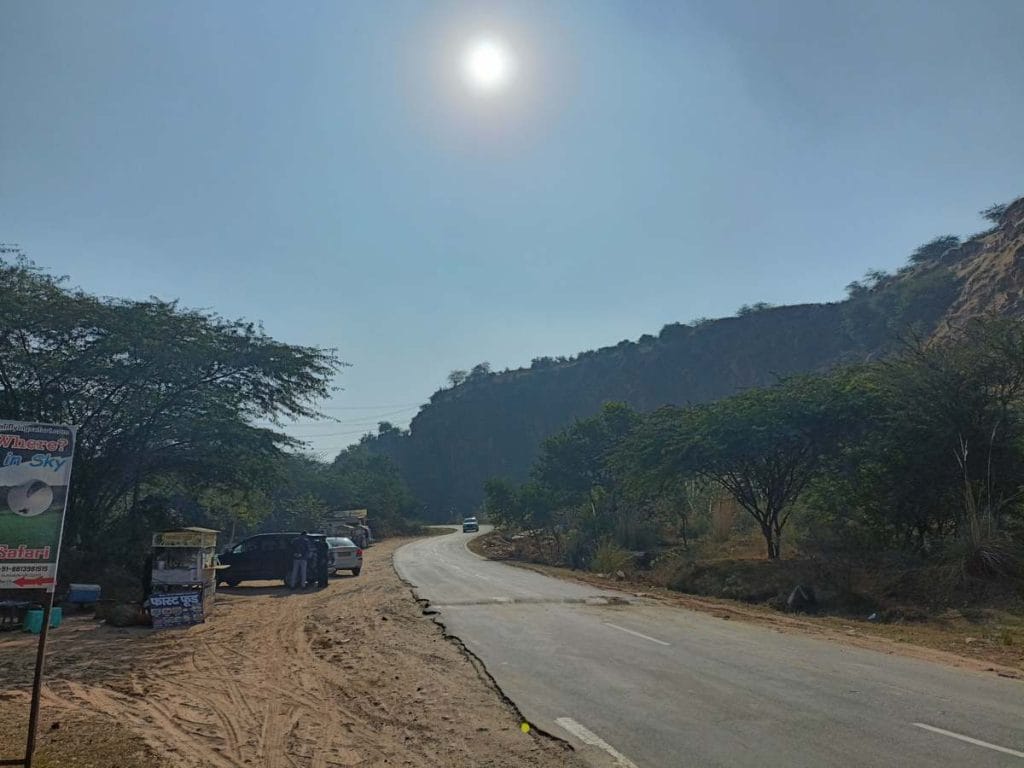
Gairatpur Bas used to be a sleepy village in Haryana, with a population of a little over 4,000 according to local estimates (and 2,000 people, per the 2011 Census). On Google Maps, it’s a grey speck surrounded by green—except now it’s got a steady stream of revellers coming in from the city.
Raju Singh, a farmer who cultivates mustard and vegetables on his 2.5 acres of land in Gairatpur Bas is afraid to let his teenage daughters leave the house on weekends because of the droves of tourists that throng to the area.
The establishments don’t have CLUs to operate cafes, and I don’t think they can get one even if they apply. The best thing would be for them to remove it, or we will have to remove it ourselves
RS Batth, GMDA nodal officer
“Now there’s boys speeding on bikes, consuming alcohol, and performing all these stunts on top of the hills,” complained Raju, whose house is barely a km away from the main road. “These unsocial elements bring down the name of other tourists also.”
Concerns about the road were raised even before it was built. In March 2018, activists Harinder Dhingra and Daniel George approached the National Green Tribunal (NGT), arguing that trees were felled illegally for its construction. The exact number of trees cut down was not recorded in NGT documents, but the tribunal ruled that any future road construction in the Aravallis must undergo a two-stage environmental clearance from the Union Ministry of Environment, Forests and Climate Change (MoEFCC).
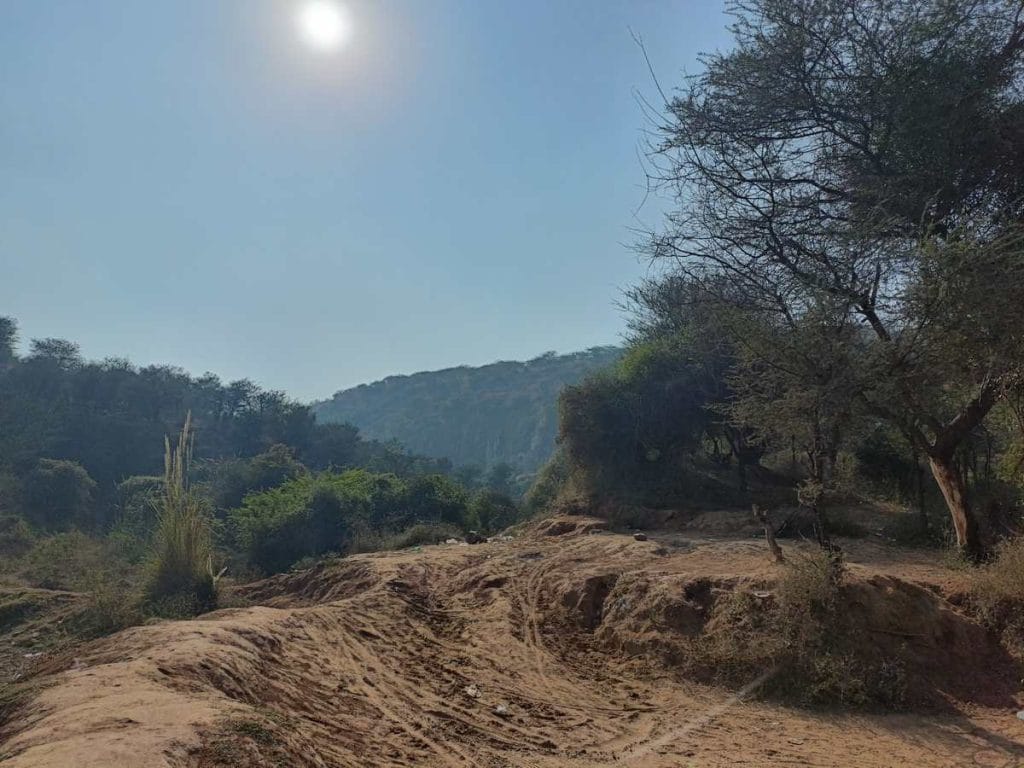
But the road wasn’t the last big plan for the area encompassing Gairatpur Bas. In 2022, the Haryana government announced its vision for a 10,000-acre safari park — spinning it as “the world’s largest safari”.
The plan, according to the state tourism department’s expression of interest document, includes children’s parks, botanical gardens, aquariums, cable cars, zip lines, and an entertainment park. While no construction activity has begun yet, the Haryana government has said the first phase of the project is expected to be completed in two years.
“If it goes ahead, it will be the death knell of Aravallis as we know it,” said Rana.
The announcement set off fierce resistance from environmentalists and citizen groups. The Aravalli Bachao Movement, a citizen-led campaign, wrote letters to the MoEFCC and then Haryana Chief Minister Manohar Lal Khattar, demanding that the plan be scrapped. Rana took the fight to the Supreme Court in September 2023, contending that the safari would cause irreversible damage to the Aravalli ecosystem. The case, which is still ongoing, cites the landmark TN Godavarman SC judgement of 1996, which prohibits ‘non-forest’ activity on forest land as an argument in favour of protecting the Aravallis against the jungle safari.
“They talk of greenery and clean air and the beauty of the Aravallis,” said Rana. “But it’s never about the forests and wildlife. It is only to make it more convenient for humans to access it.”
‘Illegal’ constructions
For Gurugram authorities, the issue with the Leopard Trail party hub isn’t its proximity to the Aravallis. They are concerned with illegalities stemming from regulatory issues, compliance, and paperwork.
In late 2022, the GMDA identified 16 cafes operating without a ‘change in land use’ (CLU) certificate.
“They are using agricultural land — some on rent, some on their own — to run commercial establishments,” said RS Batth, the nodal officer and district town planner with the GMDA. “That’s not legal.”
Proprietors have to apply for a CLU certificate if they intend to change the purpose of agricultural land. “Only once the application has been cleared will their establishment be legal,” he added.
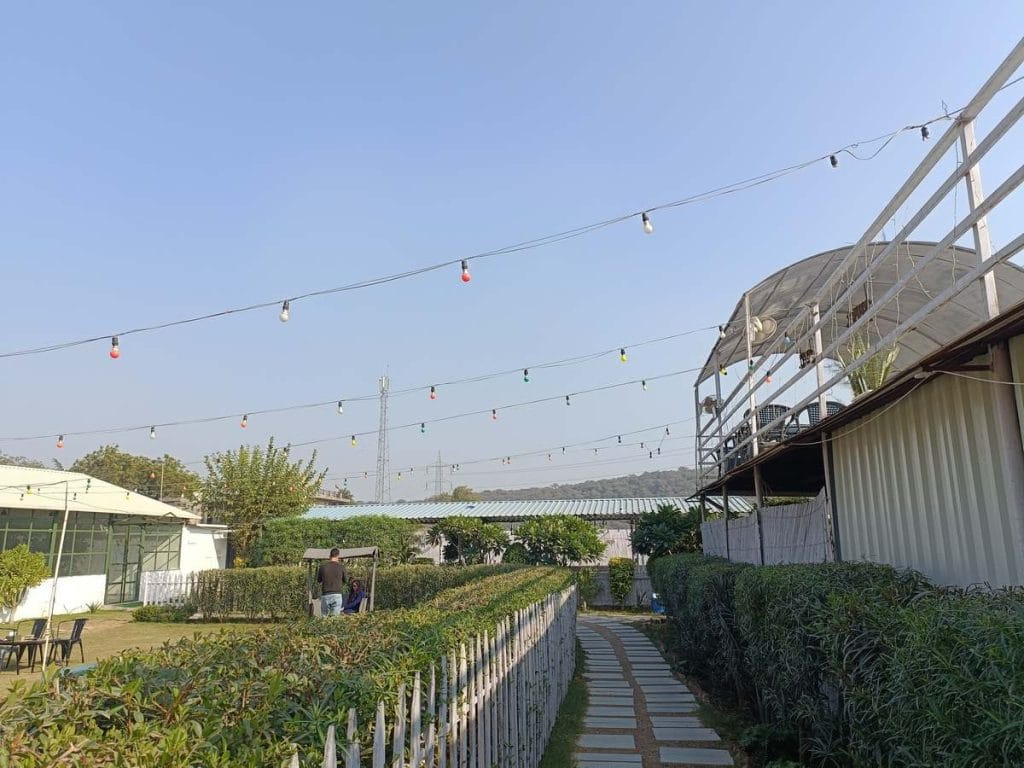
The GMDA and Haryana’s Department of Town and Country Planning (DTCP) are jointly responsible for ensuring compliance. Early in 2023, DTCP issued show-cause notices to the owners of the 16 identified cafes. This was followed by restoration to allow them time to restore the land to its original use. Then, there was talk that the government was going to raze them down. But nothing happened.
Batth chalked up the delay in action to jurisdictional confusion and election-related disruptions.
“Initially DTCP was handling these cases, but the location falls under GMDA’s jurisdiction now. Also, we were busy preparing for the general and state elections, the model code of conduct was employed, and then GRAP restrictions too,” said Batth.
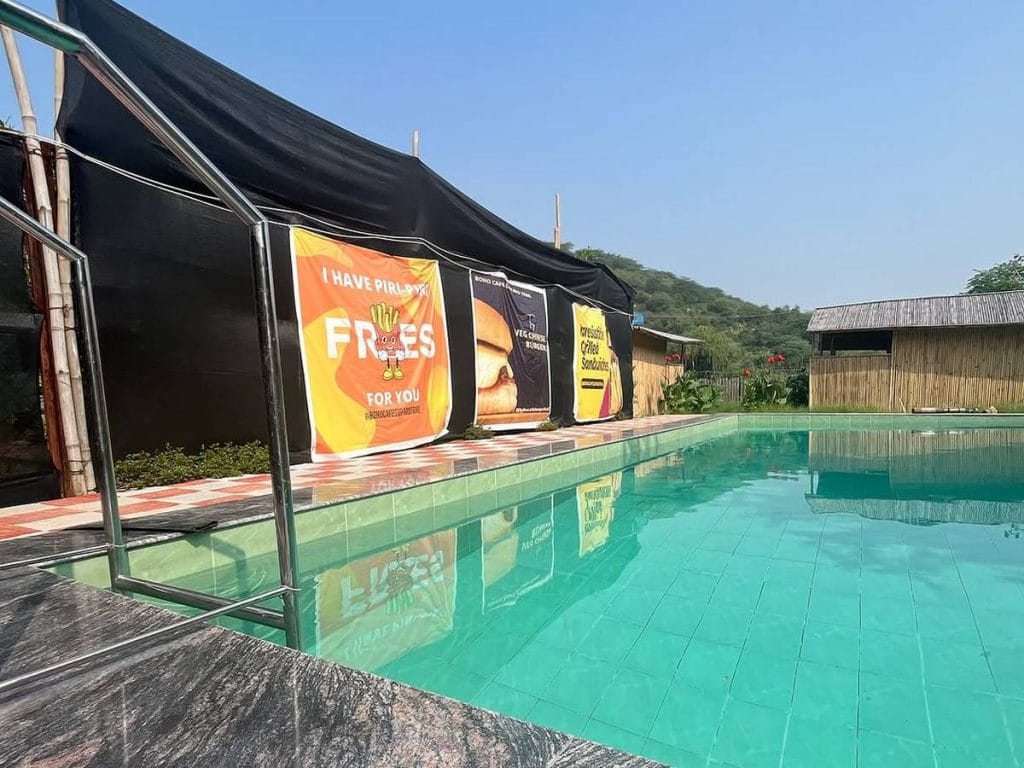
Now that Batth has been appointed as the GMDA’s nodal officer for demolitions and critical violations, he assures that action is imminent. On 11 December, he oversaw the demolition of illegal housing structures in Berhampur village. Similar action is expected soon in Gairatpur Bas and Sakarpur, according to him.
“The establishments don’t have CLUs to operate cafes, and I don’t think they can get one even if they apply,” said Batth. “The best thing would be for them to remove it, or we will have to remove it ourselves.”
In this fracas, the one authority that’s remained silent is Haryana’s Forest Department. It’s not the department’s jurisdiction, said Vineet Kumar Garg, the principal chief conservator of forests (PCCF) Haryana. However, he added that he is on the same page as the activists and environmentalists, calling the proximity of these cafes to the Aravallis a “sensitive issue”.
“We have no official record of the area being called Leopard Trail, but there is a reason for leopard sightings in the area,” said Garg. “It could part of an informal corridor that connects the Asola Bhatti Wildlife Sanctuary with the Mangar Bani and other forests within the Aravallis. There’s a lot of wildlife, including leopards, that might use this area for their travels,” he added.
Also Read: 5 pollution warriors who are fighting to save Delhi’s lungs
Fluid boundaries of the Aravallis
It comes down to the lack of clarity on boundaries of the Aravallis. There is no official record of which mountains fall under the range. These fluid lines have not only seen the rise in commercial establishments but also hindered the clampdown on illegal mining operations.
“In some places it is mining, in some places its illegal constructions and amusement parks—but they’re all justified because the government is unwilling to define where the Aravallis start and end,” said Mohit Ghugu, an activist from Rajawas village in Haryana who has been working to curb illegal mining in the range.
This lack of definition is part of environmentalists’ concern about the impact of cafes and tourist haunts on the Aravallis. Activists who have fought to protect the region from illegal mining, resorts, and now the Haryana government’s proposed jungle safari, say they’ve seen it all before.
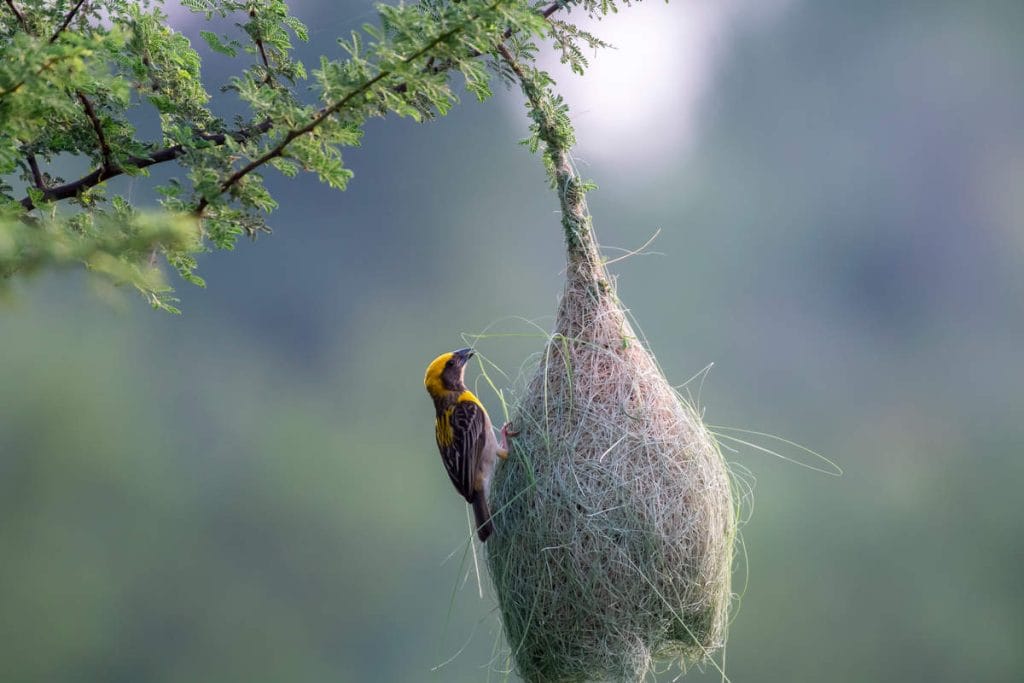
Even if the land on which the cafes are built is private, forests like the Aravallis, which shelter hundreds of species of birds and animals, require buffer zones and eco-sensitive areas to prevent human activity from encroaching into them, explained Rana.
The impact on wildlife is already visible, claimed Preeti Anand, a birder and wildlife photographer who often hikes and birdwatches at Leopard Trail.
“Two years ago, I’d see baya weaver nests near the main road! Can you believe how green and untouched it was?” said Anand. “This year, I saw not even a single baya weaver bird.”
For the likes of Anand, Rana, and other activists, things are only bound to get worse unless there’s a stop to the area’s commercialisation.
“Even if it is your private land, the floodlights, the loud music, and late-night partying carries over into the Aravalli hills which is one step away,” argued Rana. “How is this legal?”
Meanwhile, in Gairatpur Bas and the villages near Leopard Trail, rumours are swirling about big hotel chains and resorts seeking to buy land in the area to capitalise on the upcoming jungle safari.
“That is the real threat to the Aravallis and the environment, not my small restaurant here,” said a cafe owner.
(Edited by Asavari Singh)



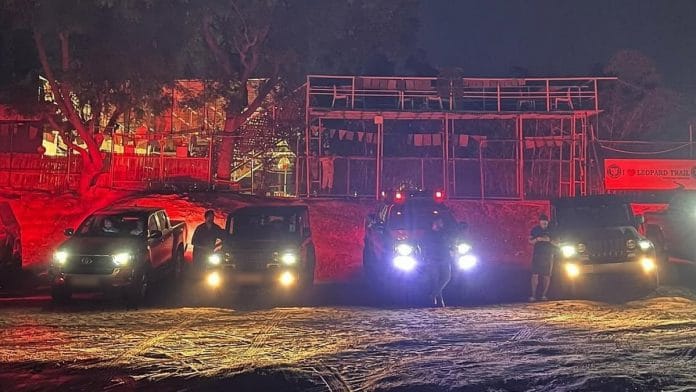



The Wildlife Department should release a bunch of leopards on this trail.
Then it would actually be fun.